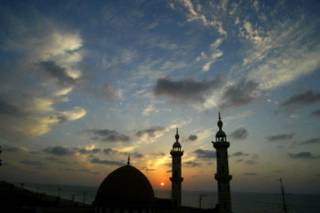PARIS - More than one billion Muslims around the world will observe Ramadan, the traditional month of dawn-to-dusk fasting, of giving and prayer that begins on Friday in most Islamic countries.
The start of the month, the ninth in the Muslim lunar calendar and which commemorates the revelation to the Prophet Mohammed of the Koran holy book is determined by the sighting of the crescent moon in each country concerned, or by astrological calculation.
Ramadan is a month of piety, alms-giving and fasting in order to instill the body and spirit with the rigours of abstinence.
During the month, practising Muslims go without food, drink, smoking and sex and refrain from impure thoughts from sunrise to sunset, in order to purify themselves and concentrate their mind on Islamic teachings.
It is traditional to break the fast with a meal, known as iftar, consisting of dates and goat's milk, as the Prophet is said to have done. The last meal before dawn is known as suhur.
Fasting is one of the five pillars of Islam but those whose health might be put at risk by going without food, the very old, the very young and pregnant women are given a dispensation.
Travellers are also exempt, but are expected to fast at a later date or pay financial compensation for their non-observation of the month.
Ramadan is traditionally a time when the practice of five daily prayers is more rigorously observed and the holy month ends with feasting and gifts on Islam's biggest festival, Eid al-Fitr, which this year falls on November 14.
Muslims are also supposed to donate two-and-a-half percent of their earnings as Zakat, or largesse, to the poor.
In many countries, non-Muslims also abstain from eating and drinking in front of those fasting, and fast-breaking is often an occasion shared by people of different faiths.
Saudi Arabia issues an annual warning to all foreigners that they face deportation if they eat, drink or smoke in public during Ramadan, while in Indonesia, nightclubs, bars, discos, saunas, massage parlours and games parlours have in the past been ordered to close for the month.
Pilgrims flock to Islam's holiest sites at Mecca and Medina in Saudi Arabia during Ramadan, especially on the last 10 days of the month. The holiest night falls on the 27th day which marks the revelation of the Koran to the Prophet in 610 AD.


No comments:
Post a Comment